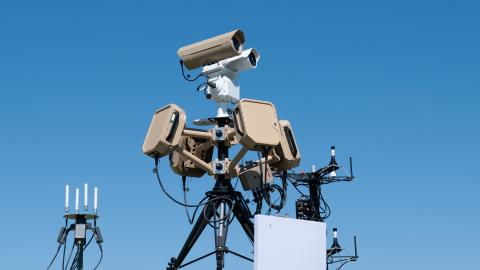The traumatic events of the past months have underlined one fundamental truth: the only thing more important than the safety and security of Americans and the United States, is preserving our personal freedom.
These are awesome responsibilities that America’s high-tech industry, including those who are advancing America’s leadership in quantum information science, need to take seriously.
Facebook’s Mark Zuckerberg has pointed one way forward. That’s protecting the constitutionally guaranteed right of free speech, by keeping Facebook as an open platform for the exercise of that right. He has done so in the face of incredible pressure to violate the First Amendment rights of one person in particular, the president of the United States—pressure even from his own employees. It’s a portrait of courage at a time when our high-tech leaders need to show they have more at heart than their bottom line.
But that’s not the only place where our high-tech leadership need to be leading, by any means. When all this is over, we are going to realize that America must be ready for, and protected from, the next unexpected “black swan” event, whether it’s another pandemic; a deliberate bioweapon attack; an electro-magnetic pulse attack by a nuclear-armed rogue nation like North Korea or possibly Iran; or an assault on our government and financial system by a large-scale quantum computer attack.
As we’ve explained many times in this column before, instead of digital bits quantum computers employ “qubits” which can represent any combination of 0 and 1 simultaneously, to encode and process data. This allows computing power grow exponentially as the number of qubits expands. A 2,000- to 4,000-qubit quantum computer, for example, would quickly decrypt almost all public-key encryption architectures—the ones used for everything from banking and credit cards to the power grid. Those architectures rely on numbers too big for conventional computers to factorize, but which a quantum computer could.
Experts disagree on how soon someone will be able to build a quantum computer of that size and capability. A recent RAND report says it might take fifteen years; the CEO of Google, however, thinks it could happen as soon as five or ten years from now. One thing is clear: the one country that has the resources to do this besides the United States is China, the same regime that has waged cyber war on America and democratic states for two decades—and that allowed COVID-19 to spread to the rest of the world and killed over 100,00 Americans.
For more than two years now I’ve been calling on policy-makers and business leaders to take concrete steps to protect us from that future catastrophic event. Now in the aftermath of COVID-19, we’re starting to wake up to the fact that preparation to deter such an attack must start now, given the complexity of the problem and the immensity of the challenge.
Fortunately, there are tools at hand to resist a future quantum computer attack. There are quantum-resistant algorithms which are designed to resist quantum penetration—although installing and implementing those defenses will take years. Then there is quantum technology itself, the use of quantum-based random number generators and quantum key distribution networks that will be essentially unhackable by quantum or any other computer.
How much will making America quantum-ready and quantum-safe cost? At this point we don’t know. But we do know that the cost of a devastating quantum computer attack will put the economic costs of coronavirus in the deep shade. Committing ourselves in the private and the public sectors to making America quantum-safe it will turn out to be one of the most important investments we can all make in our post-COVID-19 future.
When the fears of contagion finally fade; and when the broken glass is swept away and the burned-out shops and buildings are being rebuilt, we’ll realize we can’t leave ourselves vulnerable to more brutal attacks on our safety and security.
Quantum computers will do great things in the coming decade, from accelerating the development of vaccines and miracle drugs to measuring financial risk more accurately than ever before. But they will also be capable of more sinister uses, especially in the cybersecurity realm.
We at the Quantum Alliance Initiative believe we have an obligation and duty to make that quantum future as bright and safe as possible. It’s time for our political and business leaders, to feel the same obligation.
Read in Forbes

















